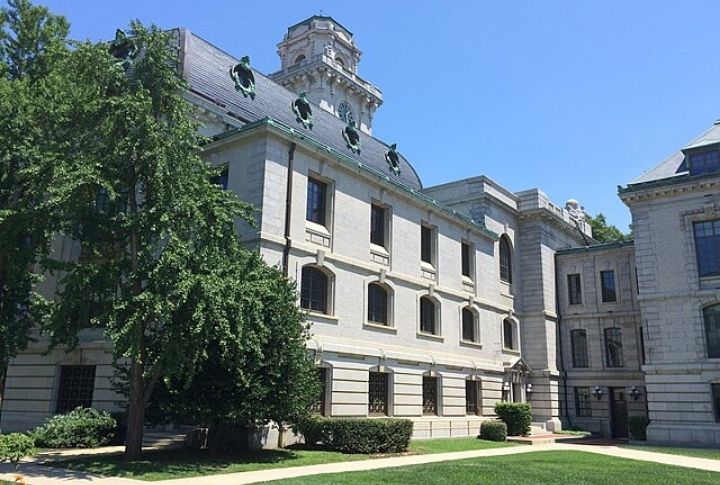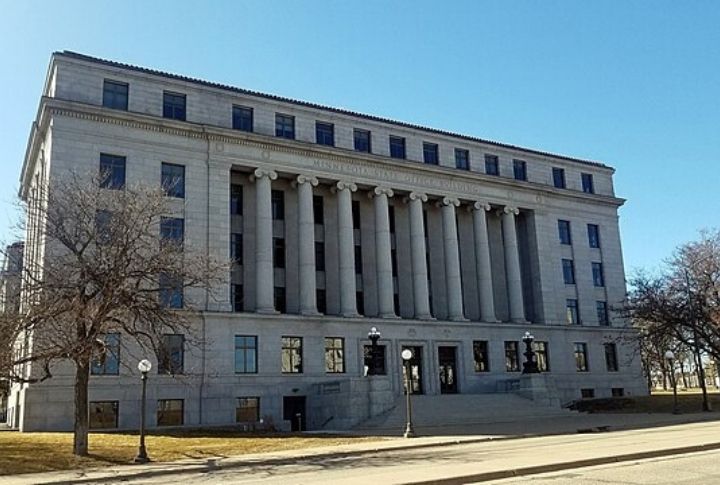
Lenders assess financial reliability using a credit score of 300 to 850. Knowing the average credit score in your state can help you assess your fiscal status and make informed choices about monetary habits. It also helps those considering relocating gauge the economic environment and make decisions based on financial well-being. Go through this list to see how your state’s credit score compares to other states.
Alabama: 691

People in Alabama demonstrate financial diligence with an average credit score of 691. Favorable credit opportunities are shared and reflect ongoing initiatives to enhance budgetary literacy among the populace, which is critical for securing advantageous lending terms.
Alaska: 723

With an average credit score of 723, Alaskans exemplify strong credit management. Higher creditworthiness in the region often leads to better loan conditions and underlines Alaska’s commitment to financial education and consumer credit health. People who live here thrive on competitive fiscal products that foster market expansion.
Arizona: 712

Arizonans have a solid average credit score of 712, indicating they are reliable lending candidates. This strong credit standing bolsters consumer confidence and statewide commercial advancement. Additionally, citizens gain from favorable borrowing terms highlighting Arizona’s well-managed economic wellness.
Arkansas: 694

Continuous efforts in Arkansas to strengthen credit awareness are making a noticeable difference by improving financial literacy and governance across the state, as demonstrated by their typical FICO score of 694. Arkansans align with national financial reliability standards, supporting personal and statewide reliable market wellness with beneficial credit terms
California: 721

Demonstrating proactive financial habits and effective credit management, Californians enhance their ability to secure premium financial offers that support the diverse economic activities thriving throughout the place. Initiatives to increase financial inclusivity are in place, further boosting these efforts. Californians maintain an average lending score of 721.
Colorado: 730

Colorado’s inhabitants benefit from their financial savvy, as evidenced by their average credit score of 730. This score remains impressive due to the strong economy, substantial average income, and practical financial education programs. Due to these solid financial standings, premium loan products and low interest rates are more accessible, promoting persistent stability throughout the territory.
Connecticut: 725

Citizens in Connecticut have a credit score of 725, indicating solid creditworthiness. This high score opens up various financial opportunities for individuals, including access to low-interest loans, favorable insurance rates, and better rental or mortgage terms. Government-driven instructional programs enhance access to beneficial borrowing options, boosting statewide prosperity. Such a stable base also draws businesses seeking dependable environments.
Delaware: 725

Delaware dwellers showcase financial prudence by securing an average credit score of 725. A high credit score shields individuals from potential credit-related challenges, including increased interest rates, challenges obtaining loans or credit cards, and restricted entry to financial services. The availability of competitive lending scales and attractive credit offerings supports personal and state economic well-being. Moreover, the considerable credit rating attracts investors seeking a secure economic climate.
Florida: 707

With an average credit score of 707, Florida has a stable financial environment. Citizens benefit from various financing options supporting housing, learning, and other essential areas, boosting Florida’s economic flexibility and resilience. Furthermore, attempts to improve fiscal know-how are underway to ensure continued commercial constancy.
Georgia: 694

A commendable mean FICO rating of 694 demonstrates good credit oversight across Georgia. State projects to bolster financial knowledge and capabilities have been effective, assisting the population in securing advantageous budgetary services. Persistent efforts aim to upgrade Georgia’s fiscal standing to even higher levels.
Hawaii: 732

Stellar financial oversight is evident among Hawaii’s inhabitants, as reflected by their typical credit mark of 732. Dedication to finance-related learning plays a significant role in achieving considerable scores that merit beneficial credit opportunities. Sustainable economic practices contribute significantly to maintaining this level of financial fitness.
Idaho: 727

Idaho is heavy on financial literacy, with an average credit score of 727. Scholastic programs promoting financial literacy help people access better credit and strengthen the economy. Idaho’s consistent ranking as one of the top states for credit health underscores the effectiveness of its financial strategies.
Illinois: 719

As indicated by a median FICO score of 719, Illinois occupants benefit from sound financial standing. The region’s strategies prioritizing fiscal know-how and customer credit wellness make secure and reasonable monetary services more accessible. Illinois’ emphasis on customer financial protection has been instrumental in maintaining substantial credit standards.
Indiana: 712

Financial oversight in Indiana is reliable, with a FICO score of 712. Such creditworthiness assists in securing advantageous loan terms and reflects the place’s actions to boost sustained growth and knowledge. Moreover, Indiana’s proactive budgetary policies have contributed to these desirable developments.
Iowa: 729

The average credit score in Iowa is 729, indicative of the residents’ impressive financial habits. Owing to the region’s commitment to financial awareness and responsible credit oversight, they can have superior loan conditions. Iowa’s steep ranking in credit averages can be attributed to its low default ratios on borrowings and mortgages.
Kansas: 721

A financially sound community characterizes Kansas, with a typical credit rating of 721. People enjoy beneficial credit terms, which promote ongoing financial health and showcase the effectiveness of state finance instructionals. Kansas’ concentration on financial counseling and debt oversight programs has significantly contributed to its people’s commendable credit marks.
Kentucky: 702

Kentucky residents generally manage their credit well, as shown by an average credit score of 702. Such a score helps them secure advantageous lending conditions, highlighting the territory’s focus on responsible financial behavior and learning. Kentucky’s strategies to reduce money-related disparities across its diverse regions have been vital to preserving this average.
Louisiana: 689

There is room for growth in credit handling in Louisiana, where the FICO rating is 689. Enhanced financial learning could improve this score, bolstering economic opportunities and financial stability statewide. State educators are integrating personal finance skills into the school curriculum to make a profound impact.
Maine: 728

Maine’s average credit score of 728 indicates substantial monetary savviness and responsible credit usage among its population. Effective economic policies and an emphasis on sustainable financial practices are vital factors that profit the population. Maine’s aggressive measures to tackle client liability have aided these intense scores.
Maryland: 716

Maryland maintains good financial health, with an average FICO score of 716, facilitating various credit offerings critical for personal and sustained overall market well-being. To sustain these positive results, Maryland has integrated advanced credit monitoring tools and financial advisory services.
Massachusetts: 732

Solid economic policies and an emphasis on financial understanding characterize Massachusetts. Citizens benefit from an average credit score of 732, which facilitates access to favorable credit conditions and underscores the place’s dedication to maintaining extreme standards of financial fitness. Factors contributing to this significant score include Massachusetts’ lower-than-average unemployment rate and its people’s high average personal income.
Michigan: 718

A significant focus on money matters in Michigan has borne fruit, while its inhabitants enjoy a median credit score of 718. This rating enhances access to financial products and promotes a conducive environment for industrial advancement and dependable personal finance management. Michigan’s improvement in FICO scores over recent years is linked to decreased delinquency rates and improved average debt levels.
Minnesota: 742

Leading the states, Minnesota prides itself on an exceptional credit rating. The average score here is 742, illustrating its commitment to financial knowledge and responsible credit practices, which ensure the best economic opportunities for its dwellers. Minnesota’s considerable score is further bolstered by the region’s substantial average household income and minimal poverty levels, factors that are often associated with better credit rankings.
Mississippi: 680

Improvement is needed in Mississippi, where financial proficiency projects could use strengthening. Its current FICO score is 680, and boosting this score would greatly enhance credit access and contribute to economic recovery and growth. Mississippi’s lower evaluations are often attributed to higher delinquencies and lower average incomes, negatively impacting credit ratings.
Missouri: 712

Missouri’s financial responsibility is reflected in its average credit score, which is 712. This score facilitates beneficial lending rates supporting individual and statewide wealth accumulation initiatives—Missouri’s score benefits from relatively stable employment rates and a focus on customer liability control.
Montana: 731

Montana residents enjoy a thriving financial environment. They benefit from a creditworthiness score of 731, supported by adequate budgetary strategies and education. This score strengthens their ability to secure excellent credit terms and supports broader commercial success. Montana’s socioeconomic well-being is also boosted by its low population density, which leads to lower credit utilization rates.
Nebraska: 731

A median FICO rating of 731, bolstered by government-driven projects focusing on economic awareness, helps maintain favorable regional credit provisions. Additionally, Nebraska’s credit ratings are helped by lower-than-average household debt ratios and higher percentages of homeownership that are positively correlated with credit marks.
Nevada: 702

Higher proportions of transient populations, particularly in tourism-centric areas, influence Nevada’s credit mark 702. Strengthening its money-specific knowledge could enhance this score and provide better economic advancement and stability opportunities.
New Hampshire: 734

An average credit score of 734 places New Hampshire among the highest in the nation. This score can be attributed to low credit card delinquency levels and a high percentage of residents with very low credit utilization. It validates the territory’s successful revenue-related policies and the handling of its populace.
New Jersey: 724

Achieving desirable effects through its economic strategies and financial know-how, New Jersey helps its occupants secure beneficial credit products with an average credit score of 724. Factors akin to steep median incomes and focusing on reducing consumer debts play a critical role in maintaining these considerable credit ratings.
New Mexico: 699

Despite facing economic impediments, inhabitants of New Mexico have an average credit score of 699. These challenges directly influence their credit control capabilities, affecting their overall score. Enhancing statewide financial know-how could improve this score, increasing access to better borrowing opportunities. Economic variability, particularly in rural areas, impacts these scores, with higher loan defaults and lower income levels contributing factors.
New York: 721

Dynamic and diverse, New York has an average credit score of 721, indicative of excellent financial habits prevalent across the state. Initiatives to educate individuals about credit use and governance have proven effective. The Big Apple’s economic policies help mitigate the impact of premium living costs on credit scores, supporting consumer financial health.
North Carolina: 707

The average credit score of 707 in North Carolina suggests an impressive fiscal foundation among residents. This score helps them manage credit products effectively, reflecting the positive impact of financial education programs. Growing economic conditions and decreasing non-employment metrics in the region contribute to improving average credit scores.
North Dakota: 733

Unsurprisingly, North Dakotans have one of the highest FICO ratings in the nation, with an average score of 733. Economic stability and low joblessness metrics in the region contribute to this high score, promoting low credit utilization and enhancing creditworthiness among the population.
Ohio: 715

Ohio shows solid financial acumen with an average credit score of 715. This score is bolstered by comprehensive money-related literacy programs and a stable economic environment that supports sound credit supervision. Ohio’s focus on reducing household debt aids in sustaining supportive credit scores.
Oklahoma: 693

An average credit score of 693 in Oklahoma signals a need for improved financial know-how and more potent economic development strategies. These enhancements could help nurture the financial understanding and overall monetary terms of its people. Excellent unemployment rates and lower average incomes in certain zones add to this lower score.
Oregon: 732

Oregon residents benefit from a FICO score of 732, which demonstrates financial solidity and responsible credit administration. The state’s economic policies, emphasizing finance-specific learning and customer credit counseling, help retain these high scores and secure advantageous budgetary conditions.
Pennsylvania: 723

The average credit score of 723 suggests effective money-related oversight within the state. This strong rating is supported by educational projects that enhance financial knowledge and promote responsible credit use among its citizens. Additionally, its consistent economic growth helps stabilize and boost the creditworthiness of its citizens.
Rhode Island: 723

With an average credit score of 723, Rhode Island shows a firm dedication to monetary fitness. The state’s initiatives to improve financial literacy among its population have positively impacted their ability to manage credit effectively. Increased median incomes and low delinquency metrics also contribute to this favorable score.
South Carolina: 696

In South Carolina, a FICO rating of 696 points to areas for improvement in financial governance and instructionals. Enhancing budgetary education projects could help raise this score as it works to overcome challenges like higher-than-average consumer debt levels and significant money-specific disparities between regions.
South Dakota: 734

South Dakota showcases an impressive financial profile, where measures to promote responsible credit use are particularly effective. With an average credit score of 734, the territory’s continued prosperity and commitment to fiscal literacy contribute to one of the highest scores nationally.
Tennessee: 702

In Tennessee, a respectable average credit score of 702 mirrors the region’s attempts to enhance financial education and manage consumer debt effectively. Market expansion in critical sectors supports improvements in creditworthiness among citizens, further stabilizing this score.
Texas: 693

Diversity and dynamism characterize Texas’s economy, where the average credit score currently stands at 693. Efforts to foster monetary learning and address economic disparities, especially in rural areas, could improve this average, reflecting the state’s budgetary potential more accurately.
Utah: 730

Good economic conditions and dedication to monetary knowledge in Utah result in its residents maintaining an average credit score of 730. Factors such as Utah’s low unemployment rate and considerable household income ratios support maintaining low credit utilization rankings, bolstering this score.
Vermont: 736

Vermont’s 736 FICO rating, one of the highest in the country, underscores the effectiveness of its financial education programs and stable fiscal environment, which its citizens enjoy. The region’s low poverty rates and extreme median incomes significantly contribute to these scores.
Virginia: 721

In Virginia, residents enjoy a typical credit rating of 721, thanks to strong economic policies and debt management resources. Urban centers, in particular, benefit from initiatives to increase money management skills, which play a critical role in supporting its overall financial wellness.
Washington: 735

Substantial economic standards and academic focus showcase Washington’s considerable ranking in financial security, evidenced by an average credit score of 735. Significant contributions from the technology and aerospace industries ensure stable employment and high average incomes.
West Virginia: 700

With new challenges, West Virginia has a standard FICO rating of 700. Finance-related diversification endeavors and fiscal awareness initiatives aim to improve this score by reducing reliance on traditional industries like coal mining, a critical factor for the region’s future financial stability.
Wisconsin: 735

Vital scholastic programs and consistent commercial development in Wisconsin support an average credit score of 735 among its occupants. Proactive consumer credit governance and low delinquency rates are evident, spotlighting the territory’s focus on sustaining high customer financial well-being.
Wyoming: 723

Solid financial health across Wyoming indicates a median credit rating of 723. Thanks to its low population density and reliance on primary industries, the place has maintained low debt levels, which has resulted in advantageous creditworthiness and sustained market growth.

Comments
Loading…